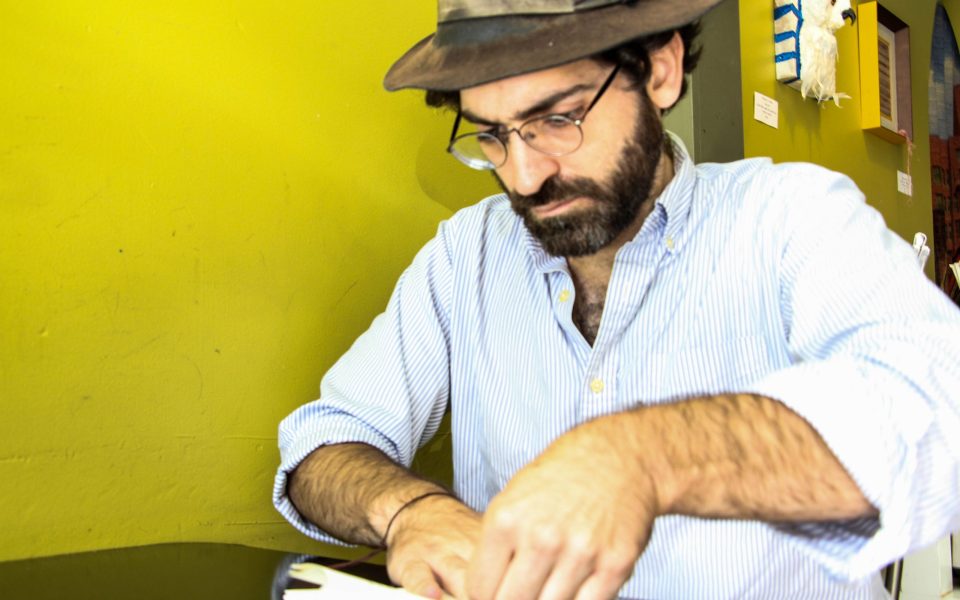by Daniel Wirtheim
Surrounded by bottles of glue, stacks of paper, manuscripts and a homemade wooden brief case, Andrew Saulters’ presence has become a fixture in the Greensboro coffeeshop scene.
His glasses slide down his nose as he delicately places a set of pages together and stitches through them to make a book’s spine. His work is methodical and polished. He’s cranked out about 500 copies of 15 different books since 2011. Come January, Saulters will assume the role of director for Unicorn Press from Al Brilliant, who along with Teo Savory founded the publishing business in 1966.
Brilliant was given the Benjamin Franklin Award by the Small Press Center in New York for a “lifetime achievement in American literature” for his toils at Unicorn Press, but after 50 years of publishing, Brilliant is ready to hand it down.
“The first time that I heard of Al and Unicorn Press, I didn’t believe it,” Saulters said. “The story was presented to me as: ‘So I know this 74-year-old guy who makes his own books by hand and he’s involved in a 45-year-old press… the story’s so charming.”
Saulters began binding his own books shortly after meeting Brilliant. The first few were test runs, complete recreations of Moby Dick only so that Saulters could design the book in the fashion he most liked. Even now, he’s most passionate when he’s designing everything — the page layout, the typeface and aspect ratio, and the shape of the book. Each one is different, based on the tone he picks up from the written work.
When printing poetry, Saulters examines each line break, considering what effect it might have on the reader. In his view, this is what literature formatted for electronic devices is lacking.

©
Kindle and other electronic reader formatting is designed to allow you to increase the size of the text, or decrease it as fits your eyesight, Saulters said. Your ability to do that means that more or less words might fit on the screen so that the idea of a measure of a piece is inapplicable, the page size is meaningless, and the notion of where the text is put on the page is “kind of kaput.”
“It’s sort of a cliché of the literary life that a young man in his thirties decides to start a small press,” Saulters said. “You’ll know many of these foolish characters before you die — I’m one of them, I guess — but I’m not starting a press, I’m reviving one.”
At one point, Brilliant had urged him to develop a house style, something that could be recognized as exclusively his own. But Saulters finds designing a new page layout part of exploring an author’s work, so he gives every book a distinct feel.
“Designing it is almost less than half of the enterprise,” Saulters said. “You design it, you print it, you bind it, but is it published yet? No, it’s not. You have to be able to get the thing to someone who maybe doesn’t even know that it exists.”
One of Saulters’ main concerns as director of Unicorn Press is attracting an audience. Getting books reviewed, creating a catalogue and finding a distributor are moves that he plans to make immediately.
“Now that I’m in this spot, not in the spot that I’m looking at books that are being made, I’m making them — spending maybe 80 hours a week making them,” Saulters said. “My concern now is publishing good work and getting it to people who want to read it.”
Eventually, Saulters wants to buy a printing press, a Vandercook SP15. It’s the kind of machine that Unicorn Press had in its heyday.
It’s a clunky machine, about the size of a regular three-cushioned couch. The equipment would be too large to fit in his “halfway condemned” second-floor apartment, but Saulters imagines that one day he could be living in a store with his press, his equipment sprawled out around him, carrying on the Unicorn Press legacy.
Join the First Amendment Society, a membership that goes directly to funding TCB‘s newsroom.
We believe that reporting can save the world.
The TCB First Amendment Society recognizes the vital role of a free, unfettered press with a bundling of local experiences designed to build community, and unique engagements with our newsroom that will help you understand, and shape, local journalism’s critical role in uplifting the people in our cities.
All revenue goes directly into the newsroom as reporters’ salaries and freelance commissions.


Kudos Andrew !